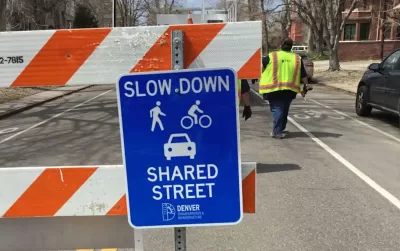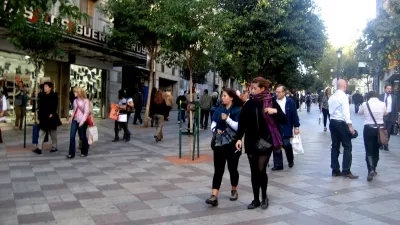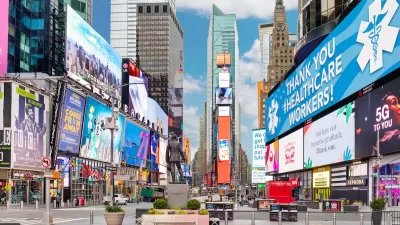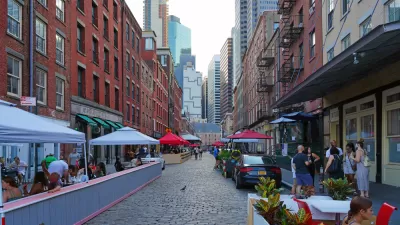The city is moving to institutionalize segments of streets that were successfully pedestrianized during the pandemic.

In a paywalled article in The Denver Post, Bruce Finley describes the city of Denver’s plan to make three segments of its downtown streets pedestrian-only permanently.
As Finley explains, “Two stretches along Larimer Street and one on Glenarm Place in the heart of downtown have entered a city process to stay closed for another five years. After 2028, those closures — backed by business owners and economic development groups — would become permanent if nobody objects.” The city will also create new open streets and green spaces on some residential streets.
“Street closures fit into a citywide long-term overhaul, costing up to $800 million a year, to enable more car-free transportation. City planning documents lay out multiple large-scale projects including the installation of more than 100 miles of “Bus Rapid Transit” — buses that move in exclusive lanes — on major routes. They also call for demarcating 400 miles of new bicycle-only lanes and making pedestrian-friendly improvements along 1,300 miles of streets.”
The city’s experience with open streets during the pandemic highlighted the benefits and challenges of pedestrianizing more spaces, Finley notes. “Over two years, city transportation officials measured a 287% spike in walking, riding scooters, and biking. In August 2021, streets reverted to vehicle-priority status and barriers were removed.”
FULL STORY: Denver moves to permanently close some streets to traffic

Alabama: Trump Terminates Settlements for Black Communities Harmed By Raw Sewage
Trump deemed the landmark civil rights agreement “illegal DEI and environmental justice policy.”

Study: Maui’s Plan to Convert Vacation Rentals to Long-Term Housing Could Cause Nearly $1 Billion Economic Loss
The plan would reduce visitor accommodation by 25% resulting in 1,900 jobs lost.

Planetizen Federal Action Tracker
A weekly monitor of how Trump’s orders and actions are impacting planners and planning in America.

Wind Energy on the Rise Despite Federal Policy Reversal
The Trump administration is revoking federal support for renewable energy, but demand for new projects continues unabated.

Passengers Flock to Caltrain After Electrification
The new electric trains are running faster and more reliably, leading to strong ridership growth on the Bay Area rail system.

Texas Churches Rally Behind ‘Yes in God’s Back Yard’ Legislation
Religious leaders want the state to reduce zoning regulations to streamline leasing church-owned land to housing developers.
Urban Design for Planners 1: Software Tools
This six-course series explores essential urban design concepts using open source software and equips planners with the tools they need to participate fully in the urban design process.
Planning for Universal Design
Learn the tools for implementing Universal Design in planning regulations.
Caltrans
Smith Gee Studio
Institute for Housing and Urban Development Studies (IHS)
City of Grandview
Harvard GSD Executive Education
Toledo-Lucas County Plan Commissions
Salt Lake City
NYU Wagner Graduate School of Public Service





























